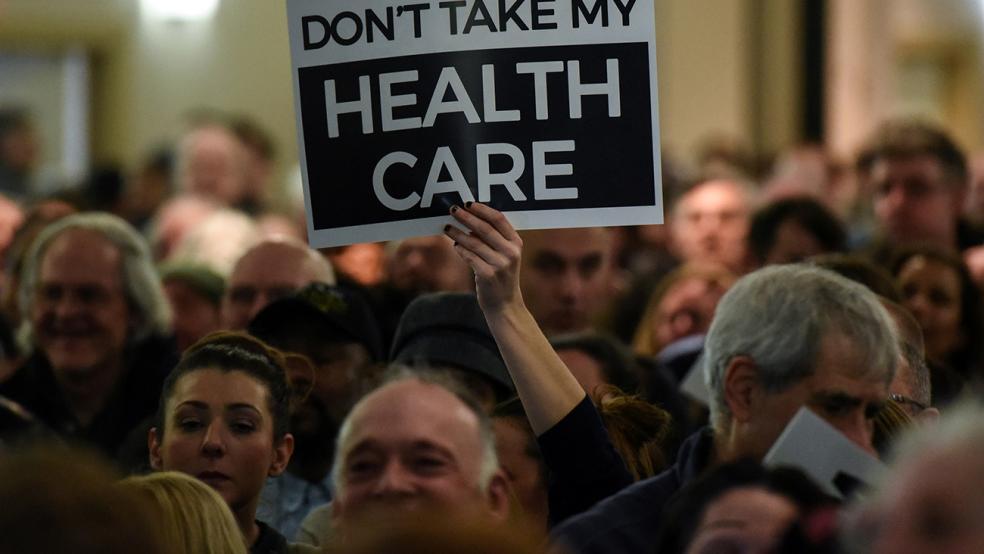As far back as February, officials at the state and federal levels were so concerned about the uncertainty roiling the market for non-group health insurance policies sold through the Affordable Care Act that they began pushing for the extension of deadlines insurers faced for setting 2018 premium rates.
The problem was that with Republicans promising to get rid of the ACA, it was difficult if not impossible for insurers to understand how to price policies in the insurance exchanges set up by the law. The possible elimination of cost sharing subsidies paid out under the ACA on top of the previous loss of other funding that the law originally promised threatened to drive insurers out of the exchanges altogether.
Related: Why Trump and the GOP Are Headed for a Health Care Meltdown
In February, when the Centers for Medicare and Medicaid Services began floating the idea of a delay in the deadline, some states demurred, expecting there would be sufficient clarity to enable insurers to set prices with a reasonable degree of certainty. Others, more doubtful, pushed deadlines out weeks and months, only to watch as worried insurers, still uncertain about what the Republican House and Senate would ultimately do, and whether President Trump would sign off on it, began dropping out of the exchanges.
Major insurance companies like Aetna eventually announced that they would exit the exchanges altogether. Others sharply restricted the parts of the country where they would do business in 2018.
Now, the final deadline is almost upon them, and those insurers who haven’t made their final decision must do so by next Wednesday. If they hoped that postponing that decision until the last minute might result in Congress delivering enough clarity to enable them to make a coherent business plan for 2018, well, they were disappointed.
The House-passed American Health Care Act, currently the most unpopular piece of major legislation that has been considered by federal lawmakers in at least a generation, is now sitting before a Senate that seems leery about taking it up.
Related: How the GOP Health Care Disaster Is Opening the Door to Medicaid for All
Senators, instead, remain locked in the secret process of crafting their own replacement for the ACA, which is being done by a hand-picked committee of 13 male members of the chamber. Senate Majority Leader Mitch McConnell, who promised a vote on the mystery legislation before the 4th of July, has had to back off that promise but is still predicting a vote shortly.
But the process has been so opaque that most members of the Senate GOP appear to have little or no clue what the bill will look like, as this telling series of interviews by Vox revealed.
It’s hard to overstate the potential for harm here to the millions of people who buy their insurance on the ACA’s exchanges. There are already dozens of US counties where no insurer will offer non-group plans through the exchanges next year, and hundreds where only a single insurer will be operating. There is every reason to believe that the situation is going to get worse before it gets better.
At this point, Congress is a long way away from producing a health care bill to replace the ACA. The House bill is almost certainly unable to pass the Senate as it was written because the ideological makeup of the Senate GOP, and its tiny majority, mean that the bill must be much more moderate to gain the necessary support.
Related: ‘More Dollars’ for Health Care: Can Anyone Explain Trump’s Puzzling Tweet?
The House bill, too extreme for the Senate, only barely passed the House, in large part because a significant number of Republicans didn’t believe it was extreme enough. So, even if it the Senate does magically pass its own version of reform in coming weeks, it faces the discouraging prospect of trying to negotiate with members of the House who have already vowed not to compromise.
This brings us to next Wednesday. By then, the Senate bill is still expected to be shrouded in legislative secrecy. The legislation may head to the Congressional Budget Office soon, because the Senate needs a budget score before it can vote on legislation, but likely won’t be available to the public until later, perhaps concurrently with the budget score, which could take two weeks or more to produce. That will be no comfort to insurers, who must make the final call on their participation in the exchanges.
There have been multiple abortive efforts in the Senate to propose methods of stabilizing the exchanges, at least as an interim measure before a Republican alternative is produced. But they have gone nowhere, not least of all because the narrative of a “failing” ACA is an essential element of Republican arguments in favor of their own health care proposals.
Related: Senate Republicans Are Headed for a July 4th Showdown Over Health Care
Experts have warned that the exodus of insurers from the exchanges could reach a tipping point, at which providers previously on the fence begin a rush for the exits, set to avoid being the final provider left in a system that offers little opportunity for profit and the very real chance of substantial losses.
Americans who rely on the ACA exchanges for their health insurance coverage had the best hope that the Senate also has a secret plan for countering a mass exodus of insurers when it becomes apparent that the uncertainty in the non-group insurance market is here for the long-term.





